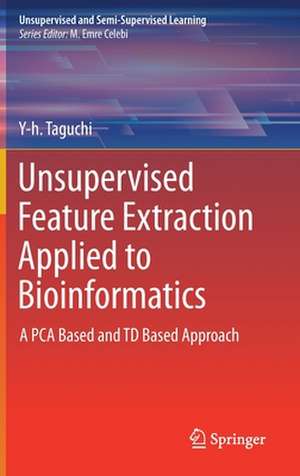Unsupervised Feature Extraction Applied to Bioinformatics: A PCA Based and TD Based Approach: Unsupervised and Semi-Supervised Learning
Autor Y-h. Taguchien Limba Engleză Hardback – 5 sep 2019
- Allows readers to analyze data sets with small samples and many features;
- Provides a fast algorithm, based upon linear algebra, to analyze big data;
- Includes several applications to multi-view data analyses, with a focus on bioinformatics.
| Toate formatele și edițiile | Preț | Express |
|---|---|---|
| Paperback (1) | 1001.02 lei 6-8 săpt. | |
| Springer International Publishing – 5 sep 2020 | 1001.02 lei 6-8 săpt. | |
| Hardback (1) | 798.45 lei 38-45 zile | |
| Springer International Publishing – 5 sep 2019 | 798.45 lei 38-45 zile |
Preț: 798.45 lei
Preț vechi: 1050.60 lei
-24% Nou
Puncte Express: 1198
Preț estimativ în valută:
152.79€ • 163.38$ • 127.39£
152.79€ • 163.38$ • 127.39£
Carte tipărită la comandă
Livrare economică 14-21 aprilie
Preluare comenzi: 021 569.72.76
Specificații
ISBN-13: 9783030224554
ISBN-10: 3030224554
Pagini: 314
Ilustrații: XVIII, 321 p. 111 illus., 94 illus. in color.
Dimensiuni: 155 x 235 mm
Greutate: 0.65 kg
Ediția:1st ed. 2020
Editura: Springer International Publishing
Colecția Springer
Seria Unsupervised and Semi-Supervised Learning
Locul publicării:Cham, Switzerland
ISBN-10: 3030224554
Pagini: 314
Ilustrații: XVIII, 321 p. 111 illus., 94 illus. in color.
Dimensiuni: 155 x 235 mm
Greutate: 0.65 kg
Ediția:1st ed. 2020
Editura: Springer International Publishing
Colecția Springer
Seria Unsupervised and Semi-Supervised Learning
Locul publicării:Cham, Switzerland
Cuprins
Introduction to linear algebra.- Matrix factorization.- Tensor decompositions.- PCA based unsupervised FE.- TD based unsupervised FE.- Application of PCA/TD based unsupervised FE to bioinformatics.- Application of TD based unsupervised FE to bioinformatics.
Notă biografică
Prof. Taguchi is currently a Professor at Department of Physics, Chuo University. Prof. Taguchi received a master degree in Statistical Physics from Tokyo Institute of Technology, Japan in 1986, and PhD degree in Non-linear Physics from Tokyo Institute of Technology, Tokyo, Japan in 1988. He worked at Tokyo Institute of Technology and Chuo University. He is with Chuo University (Tokyo, Japan) since 1997. He currently holds the Professor position at this university. His main research interests are in the area of Bioinformatics, especially, multi-omics data analysis using linear algebra. Dr. Taguchi has published a book on bioinformatics, more than 100 journal papers, book chapters and papers in conference proceedings.
Textul de pe ultima copertă
This book proposes applications of tensor decomposition to unsupervised feature extraction and feature selection. The author posits that although supervised methods including deep learning have become popular, unsupervised methods have their own advantages. He argues that this is the case because unsupervised methods are easy to learn since tensor decomposition is a conventional linear methodology. This book starts from very basic linear algebra and reaches the cutting edge methodologies applied to difficult situations when there are many features (variables) while only small number of samples are available. The author includes advanced descriptions about tensor decomposition including Tucker decomposition using high order singular value decomposition as well as higher order orthogonal iteration, and train tenor decomposition. The author concludes by showing unsupervised methods and their application to a wide range of topics.
- Allows readers to analyzedata sets with small samples and many features;
- Provides a fast algorithm, based upon linear algebra, to analyze big data;
- Includes several applications to multi-view data analyses, with a focus on bioinformatics.
Caracteristici
Allows readers to analyze data sets with small samples and many features Provides a fast algorithm, based upon linear algebra, to analyze big data Includes several applications to multi-view data analyses, with a focus on bioinformatics












